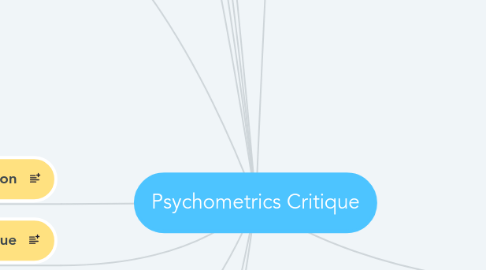
1. Holism/Reductionism
1.1. Interactionism
1.1.1. Reynolds paper
1.1.1.1. Markus/Kitayama paper
1.1.2. Generic point about Self & Society
1.1.2.1. Y1
1.1.3. Symbolic Interactionism
1.1.3.1. Y1
1.1.4. Counter: Third Party measures
1.2. L4
1.3. Y1
1.4. Situationism
1.4.1. Willmott paper
1.4.2. Y1
2. Ethics
2.1. OL
2.2. Counter examples of ethical use
2.2.1. Showing deprivation
2.2.1.1. H4
2.3. Excludes people who are outside "norms"
2.3.1. Macabasco article
2.4. Fraudulent critique
2.4.1. Collingwood paper
3. OL
4. Mind Body Problem
4.1. L5 - screencast
4.1.1. Pain example
4.1.1.1. Pain assessment critique
5. Taking a position
5.1. L7
6. Epistemology
6.1. Subjectivism/Objectivism
6.1.1. H9, L5
6.1.1.1. Qualitative/Quantitative
6.1.1.1.1. H3/H12/Daniel's Y1 session
6.1.1.2. Critique of subjectivity
6.1.1.3. Issue of classifying (people)
6.1.1.3.1. H3
6.1.1.4. Art criticism
6.1.1.4.1. L6
6.1.1.4.2. Pelowski paper
6.1.1.5. Subjectivity of perceptions/thoughts
6.1.1.5.1. Y1
6.2. Nomothetic/Idiographic
6.2.1. H9 / OL
6.2.2. Nomothetic
6.2.2.1. Green's paper
6.2.3. Idiographic
6.3. Post Positivism
6.3.1. H11/L7
6.3.1.1. Critical Theory
6.3.1.1.1. Questions realism
6.3.1.1.2. Power abuse / Ideology
6.3.1.1.3. Critique of science
6.3.1.1.4. Importance of Cultural Difference
6.4. Constructionism
6.4.1. H12/Y1
6.4.1.1. Social critiques of science
6.4.1.2. Qualitative Psychology
6.4.1.3. Reification
6.4.1.4. Deconstruction
6.4.1.4.1. L3
7. Nature/Nurture
8. Mathematical and Psychometric Properties Critique
8.1. A "blunt tool"
8.2. Likert scales
8.2.1. Counter: Other scales
8.3. Response errors
8.3.1. Research Methods texts
8.3.1.1. Counter: New practices
8.3.1.1.1. Y1- Daniel
8.3.1.2. Social desirability
8.3.1.3. Recall issues
8.3.1.3.1. Counter: Experience sampling etc.
8.3.1.4. Limits of self awareness
8.3.1.4.1. Y1
8.3.1.5. Web-based response errors
8.3.1.5.1. Gosling paper
8.4. Inherent subjectivity of responses
8.4.1. .
8.4.1.1. Critique of attitude scales
8.4.2. .
8.4.2.1. Critique of language use?
8.4.3. Lee's paper
8.5. Limits of response sets
8.5.1. Reproduces power of psy.
8.5.1.1. Counter: face validity
8.6. Weighting of factors
8.6.1. Lee paper
8.7. Questionable Measurement Practices
8.7.1. Flake & Fried paper
8.8. Validity Practices
8.8.1. Vitoratou & Pickles paper
8.8.1.1. Good practices not followed
8.8.1.1.1. Counter: New prescriptions
8.8.1.2. Publication bias against tools development
8.8.2. Reliability practices
8.8.2.1. "Epistemic continuum"
8.8.2.1.1. Lee paper
8.8.3. Boateng paper
8.8.4. Clark & Watson (2019) paper
8.8.4.1. Counter: We have not come far enough
8.9. Construct Validity
8.9.1. Latent/Observed variables
8.9.1.1. P-factor debate
8.9.2. Borsboom paper
8.9.3. Alexandrova paper?
9. Building a critique
9.1. L2, L5
10. Utility
10.1. H4
10.1.1. Case in support of psychometrics
10.2. Y1: Daniel's session
10.3. Experience of completion
10.3.1. American Pragmatism
10.3.1.1. H?
10.3.2. Example: Myers-Briggs
10.4. Can be used as part of inter-disciplinary research
10.4.1. Y1
11. Backdrop
11.1. Social History / L3 / L5 / OL
11.1.1. Individualisation
11.1.1.1. Self-help movements
11.1.1.1.1. Aristotle!
11.1.1.1.2. Phrenology
11.1.1.1.3. Victorian Self-help
11.1.1.1.4. Golden age of Psy (1950s)
11.1.1.1.5. Internet age
11.1.1.1.6. Future
11.1.2. Psychologisation
11.1.2.1. H13
11.1.3. Enlightenment
11.1.3.1. Romantic Resistance
11.1.3.1.1. William Blake & Compass antihero
11.1.4. Social Management & Contexts
11.1.4.1. Social Darwinism
11.1.4.1.1. H4
11.1.4.2. Scientific Racism
11.1.4.2.1. OL
11.1.4.3. Psychiatry: DSM/Psychopathology checklists
11.1.4.3.1. L3/L7/IS/OL
11.1.4.3.2. Dr Google
11.1.4.4. Individual Differences
11.1.4.5. "National Happiness Index"
11.1.4.5.1. IS1 "high anxieties"
11.1.4.6. Recruitment
11.1.4.6.1. L3
11.1.4.7. Dating sites
11.1.4.7.1. L3
11.1.4.8. Forensics
11.1.4.8.1. OL
11.1.4.9. Education
11.1.4.9.1. OL
11.1.4.10. Scientology
11.1.4.11. "Big Data" & Sinister AI
11.1.4.12. NSS!
11.1.5. Folk Psy
11.1.5.1. H2/L5
11.1.5.1.1. Clashes with operationalisations
11.2. Scientific Revolution
11.2.1. Empiricism
11.2.1.1. H2
11.2.1.2. Testing
11.2.1.2.1. OL
11.2.2. Positivism
11.2.2.1. H2
11.2.3. Pseudoscience
11.2.3.1. H2/L4/L5
11.2.3.1.1. The Forer Effect
11.2.4. Darwinism
11.2.4.1. H4
11.2.4.1.1. IS "dna and darwin"
11.2.5. Scientism
11.3. Early Psychometrics
11.3.1. Levels of measurement
11.3.1.1. H4
11.3.2. Link with physiology
11.3.2.1. H4/L3
11.3.2.2. Essentialism
11.3.2.2.1. H4
11.3.3. Francis Galton
11.3.3.1. H4
11.3.3.1.1. Nature/Nurture
11.3.3.1.2. Eugenics
11.4. Early Psychology
11.4.1. H3/L3/IS
11.4.1.1. Quantitative/Qualitative schism
11.4.2. Early professionalism
11.4.3. Development
11.4.3.1. OL
12. Psychology
12.1. Psychology Theory
12.1.1. Intelligence
12.1.2. Personality
12.1.2.1. OL
12.1.3. Mental Health
12.1.4. Attitude
12.1.5. Others
12.1.5.1. Psycho-social
12.1.5.2. Behaviour
12.1.5.3. Experience
12.1.5.4. State measures
12.1.6. Nomological Net
12.1.6.1. Semester 1 I-D content
12.2. Psychology Meta-theory / L2 / L5 /OL
12.2.1. Trait theory
12.2.1.1. H9
12.2.2. Humanism
12.2.2.1. H9, Y1
12.2.3. Social Psychology
12.2.3.1. H12/Y1
12.2.3.1.1. The Self
12.2.3.1.2. Traits v situations
12.2.4. Neuroscience
12.2.4.1. L4
12.2.5. Humanism
12.2.5.1. Y1/OL
12.2.5.1.1. Logotherapy
12.2.6. Psychodynamic
12.2.6.1. L3
12.2.6.1.1. Ambivalence
12.2.6.1.2. Unconscious
12.2.6.2. e.g., Jung and MBTI
12.3. Scientific Status of Psychology
12.3.1. Kline 1990
12.3.2. Validity
12.3.2.1. H12
12.3.2.1.1. Qual critique of validity is suggested
12.3.3. Need to measure variables
12.3.3.1. L4
12.3.4. Importance of status for psychology
12.3.4.1. L2/L4
12.4. Methodology
12.4.1. Psychometric focus
12.4.1.1. Do they dominate too much space
12.4.2. L2
12.5. Outer face of psychology
12.5.1. L5
12.5.2. Applied psychology
12.5.2.1. L2/4/5
12.5.2.2. Needs a form of assessment
12.6. Purpose of
12.6.1. L3
12.6.1.1. Describe/Explain/Predict/Change
12.6.1.1.1. Prediction
12.7. Relationship with cognate disciplines
12.7.1. L5
12.8. Future of discipline
12.8.1. L4/L9
12.9. Unity of Psychology
12.9.1. L2/L3
